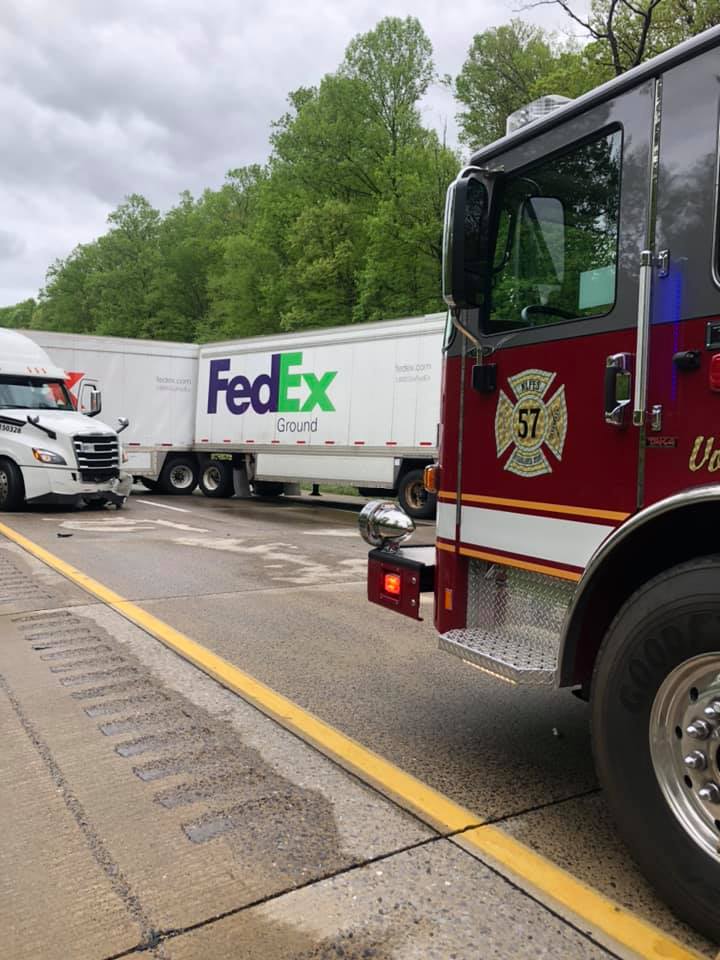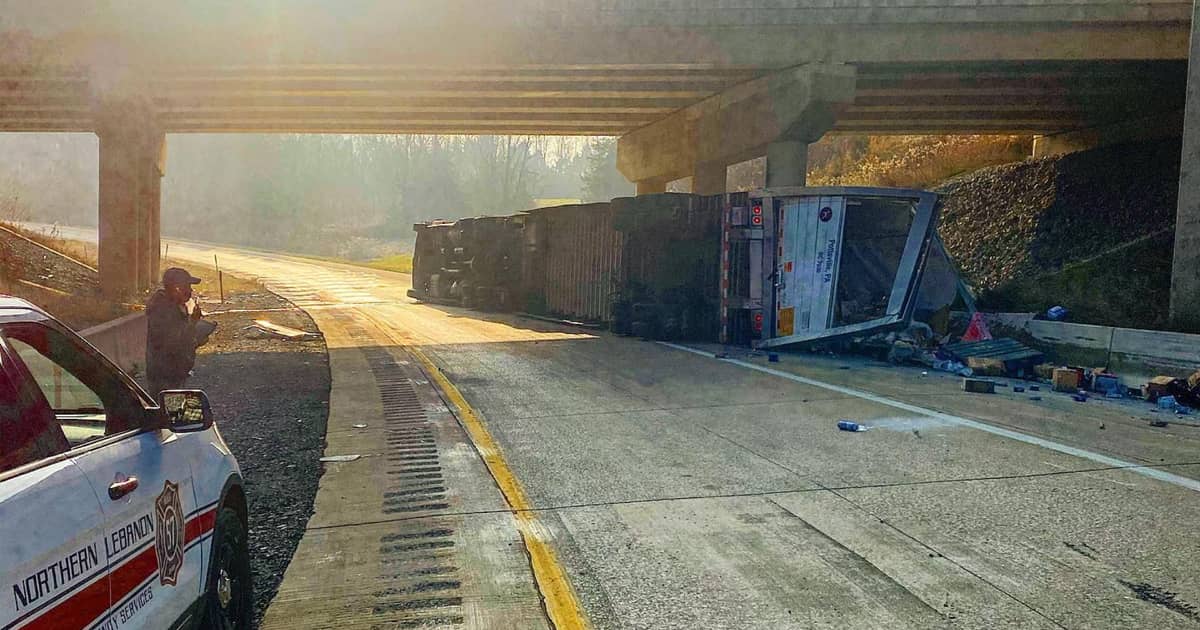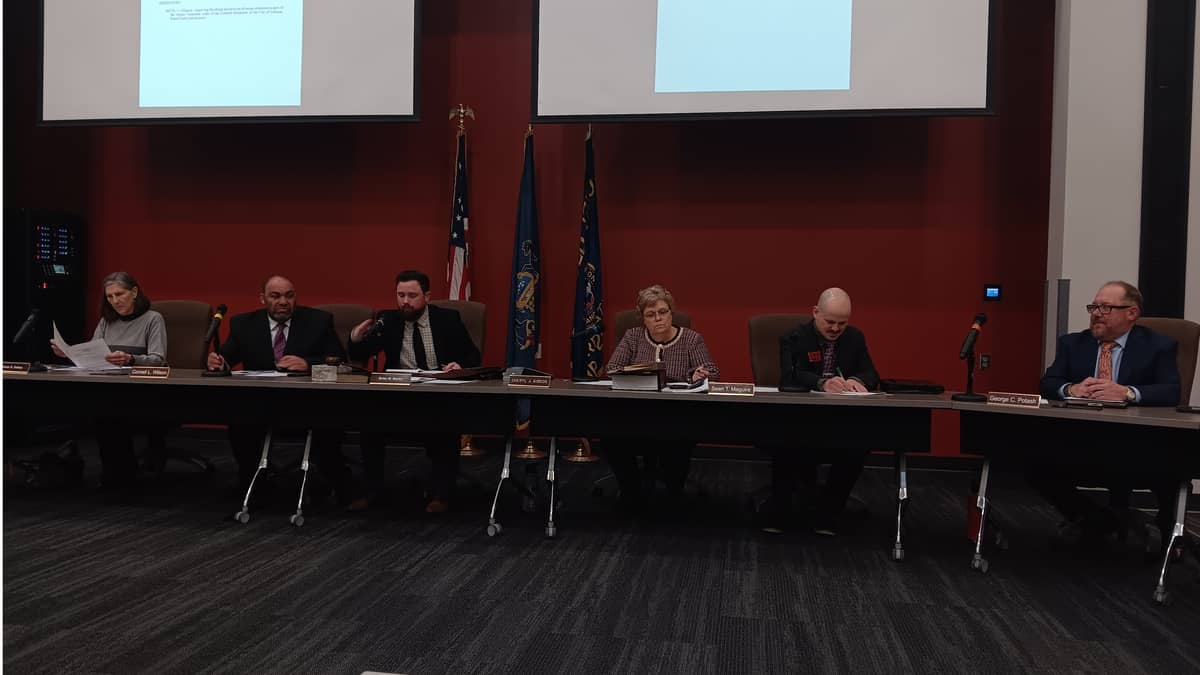Seventy-five percent of emergency calls for the Northern Lebanon Fire & Emergency Services department are for incidents on interstates 81 and 78.
However, there’s no predictable funding provided by the federal or state government for those calls, which is problematic for volunteer fire companies who perpetually fight for their financial futures.
“So, this has been an ongoing issue since before I was born,” said Dan Mohn, fire chief for NLFES, which is based in Jonestown. “A lot of the municipalities are getting to the point where they’re looking for extra funding for this as well – not just us – because we don’t get anything special for going to the interstate.”
Susan Henry, director of communications for U.S. Congressman Dan Meuser, whose district includes those two highways in Lebanon County, provided the following statement when asked for a comment from the congressman:
“Our community appreciates the brave men and women who serve in our volunteer fire departments across Pennsylvania’s Ninth District,” Meuser said. “While Congress does not specifically allocate funds to local volunteer fire departments, federal funding is available to them through grants.”
Rob Taylor, NLFES’s fire commissioner, said while his organization is appreciative and applies annually for funding from the Federal Emergency Management Agency, grants are ultimately a hope and a prayer. He added that four companies – Perseverance, Ono, Green Point and Lickdale – had merged in 2017 to create NLFES to consolidate their respective expenses.
“That federal grant is welcomed, but it should not be used for interstate problems, right?” said Taylor. “We put in for that every year and the last time we put in was to replace Green Point’s fire engine, which is 20-some years old.”
While noting this is a statewide problem, Taylor also added that Lebanon County is especially vulnerable because Interstate 81 in their coverage area is an accident-prone section of highway, given the high volume of traffic that traverses this corridor before it splits into I-78 outside of Jonestown.
Taylor added that nearly every interstate incident involves drivers from outside the county.
“Our township and our borough (are) paying for us to sit up on the interstate to provide services,” said Taylor. “It’s a federal highway run by the state, and they give us zero dollars to do it. Any fire company that runs on the interstate should be getting compensated for their calls.”
Calling the interstate “its own beast,” Taylor said the highway drains financial resources from the local municipalities who have provided taxpayer dollars to NLFES to deliver local emergency services.
NLFES receives funding from Jonestown Borough and Union and East Hanover townships, and some dollars from the commonwealth and homeowner insurance policies. However, state funding and the insurance monies amount to less than $50,000 annually.
“We can’t lump in the FEMA money we can apply for with state funding because all that does is take away from the money we get for our local citizens, right?” said Taylor. “It’s not fair for each township to pay for us, give us donation money and everything, and we’re sitting up on the interstate for three hours cutting people out of their cars – a couple hundred calls of year that have nothing to do with our townships, that have nothing to do with the money paid by local taxpayers.”

Taylor and Mohn both noted that the Pennsylvania Legislature could pass legislation that requires people at fault in accidents on interstate highways to pay for emergency services provided to them during an incident, but has not passed any bills along those lines to date. Both Taylor and Mohn also said auto insurance companies can be billed for these calls, but billing insurance companies comes with a catch.
“We can bill an insurance company, but there is nothing legally binding that says they have to pay it in Pennsylvania,” said Taylor. “This has been a problem for years. It’s something that I don’t have any idea why it doesn’t get passed. So this (billing insurance) is something fire companies in Pennsylvania have to do on their own because the state and federal government refuse to do anything about it.”
Rep. Russ Diamond (R-102), whose district includes those two highways, said he is well aware of the funding issues fire companies face, but the conversation of billing insurance companies through state law is a tough one to have in Harrisburg.
“That topic has been run up the flagpole before,” said Diamond. “Should the guy who runs off the road be billed for it by his insurance company? That may be part of the solution.”
Taylor noted the state’s response time to interstate calls is not only slow, but the commonwealth also lacks the necessary manpower to close the interstate when a call comes into 911.
”The Pennsylvania State Police don’t have the manpower to shut the roads down, PennDOT does not have the manpower to shut the roads down, so what do they do? It falls back on the volunteer fire companies, who aren’t getting any funding, and we’re just told to go and deal with it,” said Taylor. “You have 5,000 cars coming at a single guy (fire police) in his individual vehicle because nobody else can help, and the guy gets paid zero dollars to do it.”
Taylor said further exacerbating the situation is a lack of professional vehicles for the fire police who respond to calls.
“When we shut the interstate down, we have to do it with our fire police in their own vehicles,” said Taylor. “We get assistance from PennDOT, but it is an hour or two into the incident before they arrive because that’s how their system works. So, we literally have fire police who go out there in their own vehicles to shut down the highway that has a couple thousand cars coming down it every hour. We do provide the fire police with equipment, but they are at these calls in their own vehicles.”
The whole scenario is exasperating to Taylor.
“I can’t understand for the life of me how this is OK with anybody, absolutely anybody,” said Taylor. “Sorry that I get fired up about this, but I’ve been on this rant for years now. Our call volume keeps getting worse each single year, but the answer to absolutely everything is, ‘well, just do it and try to put in for a grant.’ The answer should be we’re going to fund you for this.”
Taylor said NLFES does raise about $200,000 annually through various fundraisers, but that amount is only a pittance compared to the cost of a new fire engine, which can run between $1.5 to $1.6 million.

“There is our own money that we make as a fire department – that we make as volunteers – to give into our system just so we can have the right to go out and be volunteers,” said Taylor about fundraisers held by fire companies. “The system is broken. The state needs to restructure everything and admit that we have to do something about it.”
NLFES is fortunate that it has The Perse, its social club, to help finance some of its services – although that funding source took a major hit during the pandemic, according to club manager Adam Harmon. Harmon said NLFES budgets $40,000 annually in support from the club, but had provided around $60,000 annually pre-COVID.
Another $5,000 to $10,000 is provided to other local charitable causes.
“There was a year and a half where we weren’t able to donate to anybody, not the fire company, nobody. Not a dime,” said Harmon. “Expenses were still coming, but we had a lot of credit with the bank and we went into debt, which is something we hadn’t done in a very long time.”
Unlike fire companies who don’t receive funding for interstate calls, Lebanon County’s Department of Emergency Services does receive compensation anytime it responds to federal highways for a hazmat clean-up, which seems inequitable in the minds of those who are the first on the scene.
“Not every call has hazmat at it – they get called to the big ones,” said Mohn. “All the other ones that we can handle, they’re not there for. So, they will bill, we’ll get part of their bill that they can bill from the time we get there until the time we leave.”
Tom Mohn, treasurer of The Perse, said fire company officials have taken their concerns to federal officials, but receive a response that doesn’t provide any solutions.
“If you talk to the federal government – even though it’s an interstate highway that’s covered by the federal government – (they say) the state manages it,” said Tom, Dan’s father. “So, you have to talk to the state. You talk to the state and they have no funds available for that purpose. It’s extremely frustrating.”
Meuser wrote in the same email that grants are available through the federal government to those who apply and are chosen to receive funding.
“To date, my office has helped fire departments in Lebanon County receive hundreds of thousands of dollars from FEMA through ‘Assistance to Firefighters Grants.’ If any department in Lebanon County or across the District is in need of additional funds, I urge them to contact my office for assistance. We are always happy to aid qualifying community entities to apply for federal grants.”
At the state level, Diamond said legislators in Harrisburg need to start having conversations about funding volunteer fire companies, in general, and discuss providing separate funding to those who specifically respond to interstate calls.
“These are expenses that are on top of the other expenses that they are already incurring,” said Diamond. “Equipment is through the roof. The price of complying with all of the training requirements that have increased over the years is extraordinary. These are small volunteer company personnel that do this out of the goodness of their hearts to serve their communities.”
Diamond agrees with Taylor’s assessment that reliable funding is needed, noting that the old method of conducting bake sales, chicken BBQs and bingo games is not enough to pay the bills.
“For the interstate corridors, where they are responding to people who are not in our community and who are not chipping in to fund those companies, I do believe there needs to be a revenue stream developed at a statewide level,” said Diamond, “and potentially tapping into federal funds that we already get, instead of applying for grants and a wing and a prayer.”
Saying he’s not opposed to sponsoring statewide legislation – even though he’s not on the House’s Veterans Affairs and Emergency Preparedness Committee – Diamond said serious conversations need to happen first before a legislative bill could be crafted.
If talks began now, Diamond said he envisions legislative hearings happening in the fall and potential action being taken during the next statewide budget cycle. “I’d rather get everyone involved to sit down at the table and do it right as opposed to doing a bill quickly just for the sake of doing a bill,” he said.
Although nothing is presently in the works legislatively as far as Diamond knows, Taylor believes the financial viability of volunteer fire companies who cover interstate highways is a crisis in the making.
He’s gravely concerned that volunteer fire companies everywhere are approaching a tipping point of no return.
“If you are going to continue to be unwilling to take care of your volunteer fire companies, we’ll all be out of business within the next 10 years,” added Taylor.
A follow-up email to Meuser about his views on predictable federal funding for interstate emergency calls was not returned as of publication.
Editor’s Note: Interviews with Chief Mohn and Harmon were held during LebTown’s first-ever, community-wide, live interview event held recently at The Perse in Jonestown. Interviews with Congressman Meuser, Rep. Diamond, and Commissioner Taylor were conducted following the event.
Questions about this story? Suggestions for a future LebTown article? Reach our newsroom using this contact form and we’ll do our best to get back to you.

Be part of Lebanon County’s story.
Cancel anytime.
Monthly Subscription
🌟 Annual Subscription
- Still no paywall!
- Fewer ads
- Exclusive events and emails
- All monthly benefits
- Most popular option
- Make a bigger impact
Already a member? Log in here to hide these messages
Quality local news takes time and resources. While LebTown is free to read, we rely on reader support to sustain our in-depth coverage of Lebanon County. Become a monthly or annual member to help us expand our reporting, or support our work with a one-time contribution. Cancel anytime.

























